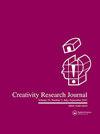Fostering Creative Agency through Screenwriting: An Intervention
IF 2.5
3区 心理学
Q2 PSYCHOLOGY, EDUCATIONAL
引用次数: 0
Abstract
ABSTRACT One of the main drivers of acting creatively is people’s belief that they can do so. Yet, most of the previous work on creative self-concept takes a domain-general perspective, telling us little about whether domain-specific interventions or activities can build people’s creative self-perception. This paper specifically considers the domain of screenwriting to investigate and enlighten the debate in the area. We analyze the impact of an intervention focused on the development of creative self-efficacy and creative personal identity in an undergraduate screenwriting course at the Griffith Film School, Griffith University, Australia. The intervention, scaffolded by a creative metacognitive framework was an integral part of the course and was delivered by a Creativity Coach. Our results suggest that enrolling in an intensive and elective screenwriting course which included targeted teaching and self-reflection about creativity and the creative process, significantly improved participants’ creative personal identity (valuing creativity) and creative performance, with no effect on their creative self-efficacy. We discuss the theoretical and practical implications of our findings and provide recommendations for future research.通过编剧培养创意机构:一种干预
本文章由计算机程序翻译,如有差异,请以英文原文为准。
求助全文
约1分钟内获得全文
求助全文
来源期刊

Creativity Research Journal
Multiple-
CiteScore
5.10
自引率
7.70%
发文量
52
期刊介绍:
Creativity Research Journal publishes high-quality, scholarly research capturing the full range of approaches to the study of creativity--behavioral, clinical, cognitive, crosscultural, developmental, educational, genetic, organizational, psychoanalytic, psychometrics, and social. Interdisciplinary research is also published, as is research within specific domains (e.g., art, science) and research on critical issues (e.g., aesthetics, genius, imagery, imagination, incubation, insight, intuition, metaphor, play, problem finding and solving). Integrative literature reviews and theoretical pieces that appreciate empirical work are extremely welcome, but purely speculative articles are not published. Readers are encouraged to send commentaries, comments, and evaluative book reviews.
 求助内容:
求助内容: 应助结果提醒方式:
应助结果提醒方式:


